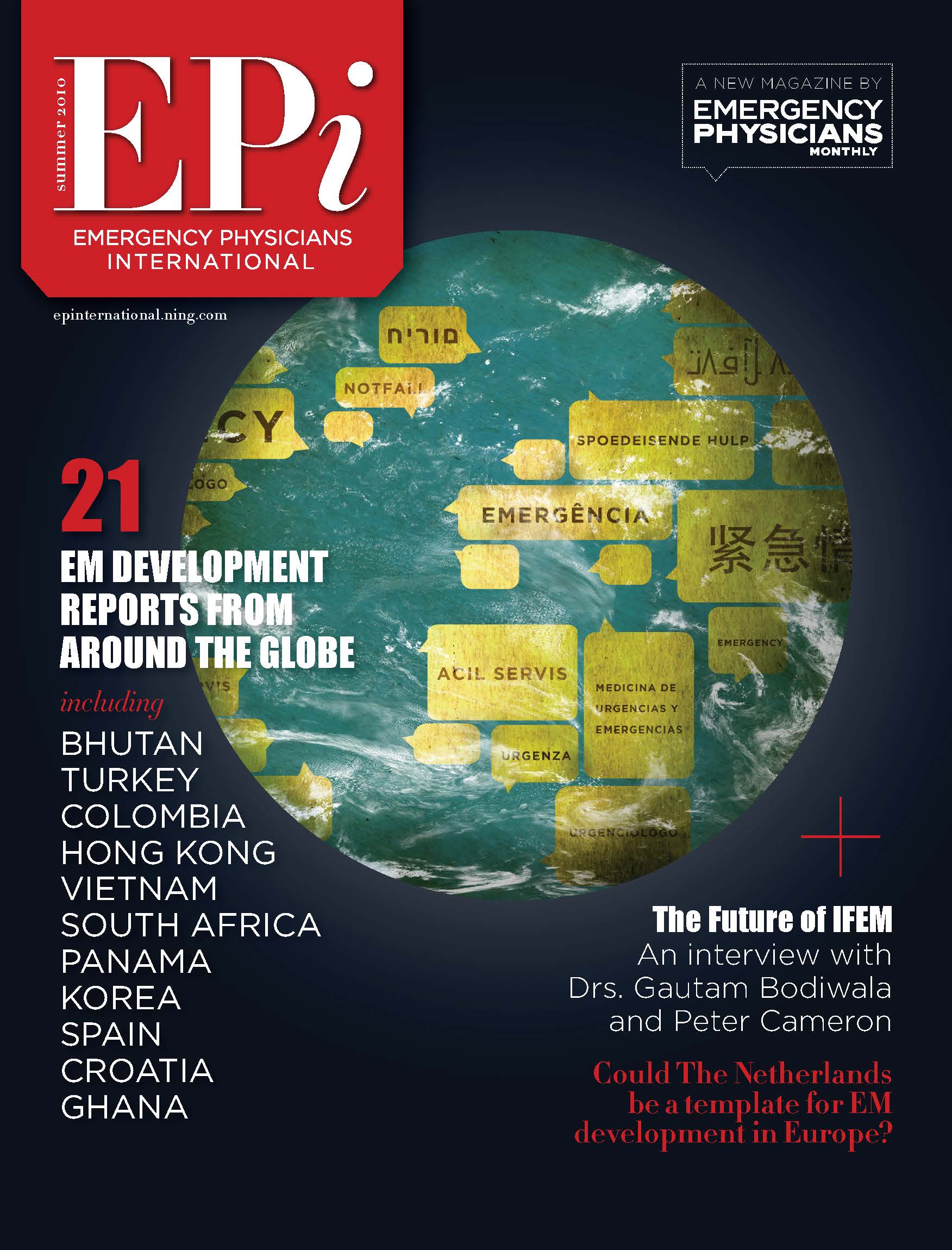Dr. Roberta Petrino Casts a Vision for European EM
This interview was originally published in Emergency Physicians International issue #21 in 2017 as the then president of the European Society for Emergency Medicine (EuSEM) looked forward to an innovative, interactive future in emergency medicine
EPI: Tell us about your own journey into emergency medicine.
Dr. Roberta Petrino: When I started many years ago, emergency medicine [did not exist] in Italy…I started as a gastroenterologist…I found out very soon after one or two years that what mostly excited me was the emergency care, critical patients in an emergency.
I remember when I first started, decided to do this job I said I had to learn what to do. And so I asked my general manager and my chief to send me to the United States, because I knew that the US had a system that was already developed. So I went for a few months in New York at Mt Sinai and stayed there to learn and to see what to do. It was really very exciting.
EPI: How did you develop as an emergency practitioner in Italy?
Petrino: In Italy there was a group of people who were feeling that that the emergency department needed to be better organized with better professionalism and proficiency. We were kind of pioneers. We were the first to build up a training program, a short training program, one year. The Italian Society of Emergency Medicine was created, and started to work with the government, the Ministry of Education, to set up the specialty. It took about 15 years, and in 2009 we had the first training program in Italy.
Another very important point was the development of the European Curriculum of Emergency Medicine. Again I had the fortune to be the chair of the group that wrote the European Curriculum of Emergency Medicine. It came out in 2008/2009. It was a job that was done by a multinational group. We had representatives from each national society that was part of EuSEM. It was again a very important move because many countries adopted it. Even Italy that was developing its training program for the specialty, adopted the European curriculum as a guideline for developing ours.
EPI: So you became involved with EuSEM organically, in that you were interested in emergency medicine and then deeply involved in its creation?
Petrino: I worked for European emergency medicine from the very beginning…more than 15 years. I had the opportunity to write the first edition of the curriculum, which was very short and very basic, in 2002. Then the second and more comprehensive one was in 2009. And then I promoted the development of the European Board Examination in Emergency Medicine (EBEEM).
EPI: You have worked with emergency practitioners from all over the world. Why is global collaboration important in emergency medicine? Is it more or less important than in other specialties?
Petrino: We think that global collaboration is important in general in medicine because patients are patients everywhere in the world, so the advancement of knowledge is important everywhere. But in particular for emergency medicine, because you may find when you are travelling that you may not get a good treatment everywhere. From a cultural point of view [we need] to make very clear that the right to be cured in an emergency is a universal right. Anywhere, in any place, all people have the right to be cured in an emergency. Even in the poorest place in the world…It is important that the quality of emergency care is the same everywhere...So to do that it is important to have a global collaboration, to have an exchange with colleagues from all over the world. And the places that are more developed [should] give a hand to the places that are still developing.
EPI: What are some of the challenges with developing emergency medicine across a continent with as many diverse cultures, languages, and lifestyles as Europe?
Petrino: It is very challenging because emergency medicine is coming from different traditions and origins in different countries. In some [it originates] from pre-hospital [care], in some others from the hospital….The different languages are a barrier, but not too [serious] because the young generations of doctors and nurses are widely English-speaking, in particular in all northern and central Europe…There is a great tendency [toward] “cooperation” in the process of developing EM. This means that some doctors are traveling and exchanging experience in other countries, and then go back to their country of origin and build up the experience. I have been in several countries, like Serbia, Croatia, Slovenia, Romania, Hungary, Slovakia, and others, and I have found a lot of commitment in the development of Emergency Medicine according to the European Curriculum and the European rules.
EPI: Do you think there is an EM practice structure or system that will work across all countries in Europe? What would that system look like?
Petrino: I think there is a common structure that is based on competence. The [European] Curriculum, which is now being revised, [presents] all the competencies for the emergency physician. These are not only clinical, but for communication, organization and management, ethics, research, and education. There are [recommendations] on the structure of training, and on the standards for an emergency department as a training center. Following these [recommendations], the emergency medical systems must be organized in a common way, and the standard of care should be similar. We know that at the moment this is not yet so, but the process is on this way. The development of the European Board Examination in Emergency Medicine is a way for certifying this process and these competencies. In any case, a system should have a strong hospital-based emergency department.
EPI: EuSEM lists a commitment to public health as one of its tenets. What is the emergency physician’s responsibility to public health? Do you have any examples?
Petrino: Our commitments are not only clinical, but also aimed at prevention, and the education of patients and population. One important example is the development of safety equipment on cars, which was [pushed] by the campaigns made [about] damage and death due to car accidents. The same could be [done] for prevention in disasters, or even during the response to disasters…Another very recent example [of a problem that needs to be addressed] is the wave of mood against vaccines that is circulating in these last months. So basically [we promote] a commitment…based on personal communication to the patient, on more comprehensive action on public health promotion.
EPI: What are your goals for this EuSEM conference in Athens? Are there particular overarching themes or topics you hope to address?
Petrino: We are presenting a new format for the conference…We will have of course the updates and keynote lectures, but we will have many sessions that will be much more interactive with pros and cons, with question and answer to the audience, with interactive items like voting systems with cell phones…so we are trying to be a bit more social and more modern, and to involve the audience in the discussion.
We will have the Sim Wars, simulation sessions…There will be two teams that will be playing together with two mannequins and two identical scenarios at the exact same moment. There will be a big networking lunch where the young doctors will meet the older people like me (laughs), and we hope to bring inspiration. Any person that may want something from us can propose a collaboration. We have a nice social program for networking…Of course we have developed the not very “hot” topics like geriatrics, pediatrics etc... but also disasters, refugees, the problem of [both] natural disasters and [man-made] disasters, so the terrorist attacks and so on that are so important at this moment in Europe right now. So, of course, we need to be present in this problem.
EPI: How would you like to see emergency medicine training evolve over the next decade?
Petrino: It is now very well established that emergency medicine is best trained by simulation exercises and real-scale exercises. For this reason we are promoting courses that encompass such for training, and [supporting] that the EBEEM is based on clinical scenarios on high fidelity manikins and human role players. The implementation of simulation environments that [reproduce] the ED [environment], for example the shock room, will increase the experience of learning, and should reduce drastically the rate of errors, with the possibility to review and criticize the simulation session.
EPI: How do you see emergency medicine developing as a specialty in the future? What are potential pitfalls?
Petrino: First of all the objective is the [initiation] of the emergency medicine specialty in the few countries, like Spain, Portugal, Greece, Austria, and Germany, that still don’t have it. We hope that promotion from outside Europe will also help in this aim.
The major pitfall for the specialty of emergency medicine is the difficulty in finding specialized emergency doctors…It is [vital] that governments everywhere understand that EM is necessary, and will lead to a reduction in expenses for healthcare and also in reduction in the need for specialists, because of the reduced number of consultations and admissions [in good EM systems]. Some resources should be diverted from other specialties to EM to be able to create well-organised, well-equipped EDs.
This is above all a political issue, for this reason the EuSEM is working in tight collaboration with the UEMS (European Union of Medical Specialists) Section and Board in EM. [We are] dialoging with the EU parliament and government [to make] the rules and standards recognized and established, at least inside the EU countries.
EPI: What advice do you have for trainees and students interested in emergency medicine?
Petrino: Be aware that EM is the best possible job only if one is ready to adapt to an “unconventional life.” That means working at night, on Sundays, on Christmas…Do not be surprised on the possibility of a sudden overload of work, of a disaster response, of communicating bad news, of being frustrated by [angry, stressed] people. If this is not a problem, the satisfaction of saving lives, working in a team, multi-tasking, being open-minded…being the first in seeing the patient and solving the problem is difficult to compare.






